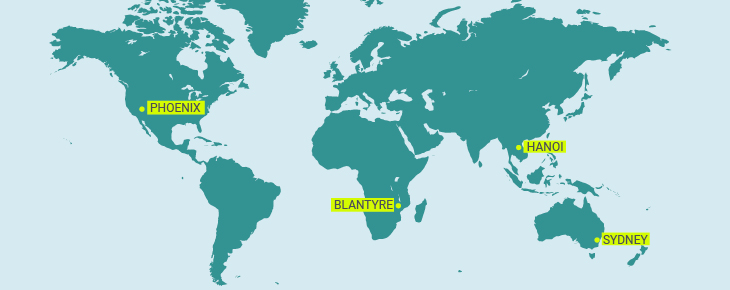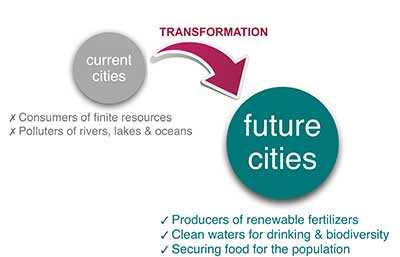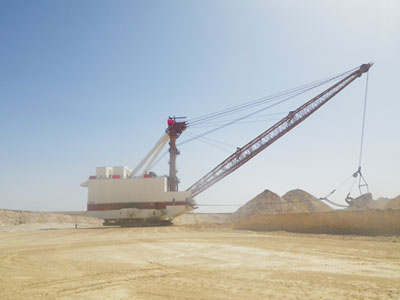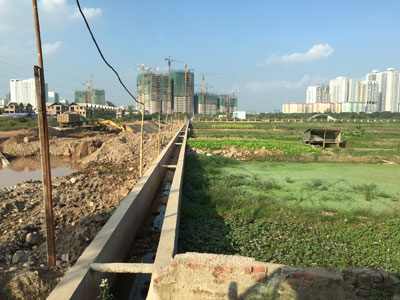
 This collaborative cross-city project identifies how our food systems, in any country, can cope and transform in response to the emerging global phosphorus challenge.
This collaborative cross-city project identifies how our food systems, in any country, can cope and transform in response to the emerging global phosphorus challenge.
This will ultimately transform cities from being huge polluters and consumers of finite resources, to producers of renewable fertilizers, ensuring both our farmers can feed our population and our water is clean for drinking, biodiversity and recreation.

Mining phosphate rock: a scarce global resource
Without phosphorus, we cannot produce food. Phosphorus is an essential nutrient for plant growth, used in fertilizers to ensure high crop yields. All farmers and countries need access to phosphorus to produce food, however there is a limited amount of finite phosphate rock globally and it is mined in only a few countries. Morocco alone controls 75% of the world’s remaining phosphate reserves. Global phosphorus demand is increasing to feed more mouths and changing diets, and is expected to surpass supply in the coming decades. Cheap fertilizers will be a thing of the past.
At the same time, four-fifths of phosphorus mined is lost along the food chain from mine to field to fork, contributing to widespread nutrient pollution of the world’s water bodies.
The implications of global phosphorus scarcity for food security is emerging as one of the biggest global sustainability challenges this century, yet there are no effective global or local governance mechanisms in place to ensure long-term access to the resource and to stimulate and support sustainable phosphorus practices.
Ultimately, achieving phosphorus security is about ensuring farmers have access to fertilizers to produce food, agricultural soils are fertile, the global population’s nutritional security needs are met, rural livelihoods are supported and our water is protected from nutrient runoff. This means ensuring phosphorus is available and accessible in the short and long term, that it is used efficiently and effectively and that its use is supported by effective governance mechanisms.

Tensions and opportunities among urbanization,
water and agriculture in Hanoi, Vietnam.
More than half the world’s population already live in cities – demanding food, water, housing, jobs and putting huge pressures on existing land, energy, transport systems and other resources. This has led to pollution, insecurity of tenure and congestion in many cities.
Cities, as centres of food consumption and waste generation, can play a key role in more sustainable management of phosphorus. For example, efficiently capturing phosphorus from wastewater and food waste for reuse as renewable fertilizers in peri-urban agriculture.
Working collaboratively with city stakeholders in Vietnam, Australia, Malawi and the U.S, the P-FUTURES project assesses the urban vulnerability to phosphorus insecurity and each city’s unique capacity to transform.
The objectives are to:
- facilitate cities in transforming how they govern phosphorus, taking into consideration their unique local context, synergies with other local sustainability goals, and global phosphorus security goals
- co-develop a sustainable urban phosphorus framework with partner cities (Sydney, Hanoi, Phoenix and Blantyre)
- guide transformation towards phosphorus sustainability through building capacity and small-scale projects
Intensive stakeholder workshops in each city explore local risks and opportunities associated with global phosphorus scarcity. The nature of each city’s phosphorus vulnerability and how they choose to adapt or transform is dependent on local factors like farmers’ purchasing power, the sensitivity of waterways to nutrient pollution, dependence on phosphate imports and the status of transport and sanitation infrastructure.
- Significant changes with big implications
- Real lasting change (persistent change)
- Affects multiple scales (household to global)
- Cross-sectorial
- Equitable (sustainable)
Linking phosphorus to existing city priorities including food security and water scarcity, aims to start a dialogue towards the development of desirable scenarios and sustainable phosphorus adaptation strategies. The project engages diverse stakeholders, including urban planners, water and sanitation service providers, peri-urban farmers, fertilizer retailers, food producers and consumers, solid waste managers and environmental managers.
AUSTRALIA:
Institute for Sustainable Futures,
University of Technology Sydney
VIETNAM:
Institute of Environmental Science & Engineering,
National University of Civil Engineering
USA:
Julie Anne Wrigley Global Institute of Sustainability,
Arizona State University
MALAWI:
Center For Water, Sanitation, Health & Appropriate Technology Development,
University of Malawi
The full list of P-FUTURES collaborators (researchers and stakeholders) include:
Sydney researchers:
Dr. Dana Cordell, Research Principal, Institute for Sustainable Futures, University of Technology Sydney, Dana.Cordell@uts.edu.au,
Dr. Genevieve Metson, Visiting Research Fellow, Institute for Sustainable Futures, University of Technology Sydney, genemetson@gmail.com
Dr. Brent Jacobs, Research Director, Institute for Sustainable Futures, University of Technology Sydney,Brent.jacobs@uts.edu.au,
Professor Stuart White, Director, Institute for Sustainable Futures, University of Technology Sydney, Stuart.white@uts.edu.au,
Dr Dena Fam, Chancellor’s Postdoctoral Research Fellow, Institute for Sustainable Futures, University of Technology Sydney, Dena.Fam@uts.edu.au
Sydney stakeholders:
Horticulture Australia
Sydney Water (wastewater)
Chinese Growers Association
Resource Recovery Australia
NSW Department of Planning & Environment
NSW Department of Primary Industries (Agriculture)
NSW Office of Environment & Heritage
NSW Government Local Land Services (Greater Sydney)
NSW EPA
Sydney Peri-Urban Network / Wollondilly Shire Council
ACE Ohlsson (agricultural & horticultural Sydney suppliers)
Green Connect (jobs & urban sustainability)
Hawkesbury Harvest / University of Western Sydney
NSW Department of Primary Industries (Water)
Agricultural Consultant
Blantyre researchers:
Dr. Vanwyk Chikasanda, Dean, Faculty of Education and Media Studies, University of Malawi – The Polytechnic, vchikasanda@poly.ac.mw
Dr. Bernard Thole, Associate professor, Physics and Biochemical Sciences / Water Sanitation, Health & Technology Development (WASHTED), University of Malawi – The Polytechnic, bthole@poly.ac.mw
Mr. Save Kumwenda, PhD student, Ecological Sanitation, WASHED University of Malawi – The Polytechnic, skumwenda@poly.ac.mw
Dr. Tracy Morse, Research Fellow & Senior Lecturer, Department of Civil and Environmental Engineering, University of Strathclyde, tracythomson@africa-online.net, http://www.strath.ac.uk/malawi/projects/chikwawaproject/
Dr. Elizabeth Tilley, Researcher, Development Economics, Humanities, Social and Political Science, ETH Zurich and Eawag, tilley@nadel.ethz.ch, http://www.nadel.ethz.ch/index_EN
Dr. Salule Masangwi, Director, Centre for Water, Sanitation, Health and Appropriate Technology Development (WASHTED), University of Malawi – The Polytechnic, http://washted.ac.mw
Blantyre stakeholders:
Blantyre City Council (Wastewater plant operator)
Urban farmers
Blantyre City Council (Health & social services)
Blantyre
Blantyre Water Board
Blantyre ADD
OPTICHEM Fertilizers
Nambazo mining in Phalombe (Tundulu rock)
Wildlife and Environmental Society of Malawi
Consumer Association of Malawi
Resident
The Polytechnic
Water for People
PLAN Malawi
Phoenix researchers:
Dr. David Iwaniec, Assistant Research Professor, Global Institute of Sustainability, Arizona State University, David.Iwaniec@asu.edu, https://sustfutures.wordpress.com
Dr. Dan Childers, Professor, School of Sustainability, Arizona State University, Dan.Childers@asu.edu, http://weel.asu.edu
Dr. Nancy Grimm, Professor, School of Life Sciences and the Global Institute for Sustainability, Arizona State University, nbgrimm@asu.edu
Dr. Genevieve Metson, Visiting Research Fellow, Institute for Sustainable Futures, University of Technology Sydney, genemetson@gmail.com
Phoenix stakeholders:
Arizona Forward
Arizona Interfaith Power & Light
Arizona State Climate Office
ASU representatives (Central-Arizona Phoenix Long-Term Ecological Research, Decision Center for Desert City, Julie Ann Wrigley Global Institute of Sustainability)
Departments of Planning, Public Works, Environment and Sustainability, and Water Resources from the cities of Scottsdale, Phoenix, Mesa, Tempe, and Goodyear
Keep Phoenix Beautiful
Maricopa Association of Governments (Department of Public Health, Department of Transportation)
Maricopa Flood Control District
Sonoran Institute
Luke’s Health Initiative
United States Environmental Protection Agency
United States Department of Housing and Urban Development
University of Arizona Cooperative Extension
Valley Permaculture Alliance
Watershed Management Group
Hanoi researchers:
Dr. Nguyễn Việt Anh, Director, Institute for Environmental Science & Engineering, National University of Civil Engineering, vietanhctn@gmail.com, www.nuce.edu.vn
Dr. Dang Thi Thanh Huyen, Lecturer/Researcher, Institute for Environmental Science & Engineering, National University of Civil Engineering, huyendangctn@gmail.com
Ms. Ta Quynh Hoa, Senior Lecturer/ Deputy Director International Cooperation Development, Faculty of Architecture & Urban Planning, National University of Civil Engineering, hoaquynhta@gmail.com
Ms. Đào Minh Nguyệt, Lecturer/Researcher, Institute for Environmental Science & Engineering, National University of Civil Engineering, mnguyet.dao@gmail.com
Ms. Bùi Thu Thủy, Researcher, Institute for Environmental Science & Engineering, National University of Civil Engineering
Hanoi stakeholders:
Vietnam Institute for Urban and Rural Planning (VIUP)
Urban Environmental Company of Gia Lam District, Hanoi
Hanoi Urban Environmental Company (URENCO)
Hanoi Sewerage and Drainage Company (HSDC)
Association of Small and Medium Entreprises of Kim Chung Communes
Hanoi University of Sciences
Water Resources University
Vietnam National University of Agriculture
Hanoi School of Public Health (HSPH)
We are now inviting funding partners for Phase 2. If you are interested in this opportunity, please contact Dr Dana Cordell (Dana.Cordell@uts.edu.au).
Phase I of P-FUTURES is funded by the Swedish International Development Agency under the International Social Science Council’s Transformations to Sustainability programme – a contribution to Future Earth. Supplementary support for seed grants is provided by the Swedish Secretariat for Environmental Earth System Sciences (SSEESS), the Netherlands Organisation for Scientific Research (NWO), the Economic and Social Research Council (ESRC) UK through the Newton Fund and the National Research Foundation of South Africa



